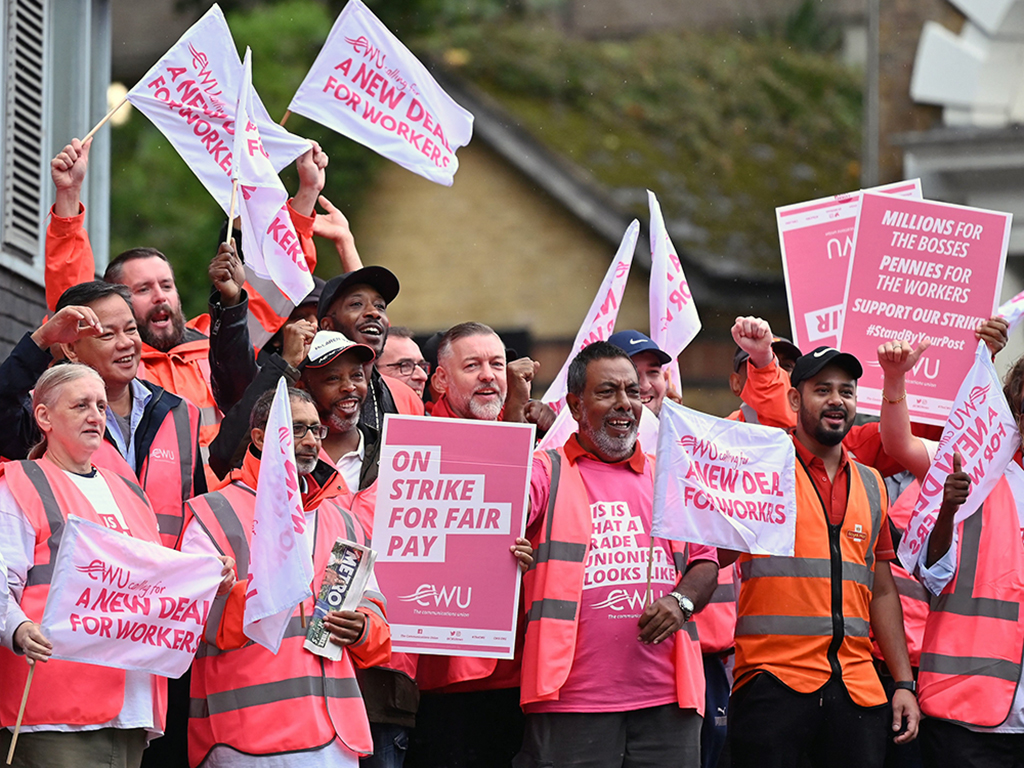
Nadhim Zahawi emailed me on Friday morning. (Not personally, alas; surprisingly few senior Tories have ever felt me worth cultivating. It was the Conservative Party mailing list we journalists feel compelled to subscribe to.) “Union leaders want to ruin the Christmas plans of millions of Brits,” the message began. “And we’re the only Party standing up.” The subject line was “Labour’s Christmas Nightmare”.
There are two things that are weird about this (three, if you count the capitalisation). The first is that – you may have noticed this – Labour isn’t in power. Whatever one thinks of the link between the opposition and the union movement – whether it’s good or bad, whether it’s as strong as it once was, whether Keir Starmer is betraying his party’s roots by not standing firm with the workers – it’s entirely irrelevant. Not one of the decisions that led us to this remake of the Winter of Discontent (2 Winter: 2 Discontented) has had anything to do with the Labour Party. It’s as though the Tories have forgotten who’s in government – which would, to be fair, explain things.
The other weird thing about this choice of attack line is its timing. Recent weeks have brought evidence to suggest that, Christmas nightmare or not, strike action is currently unusually acceptable to the public at large. Polling from YouGov this month found that, while the largest share of voters (43 per cent) believed the trade unions were behaving unreasonably, the government was seen as more unreasonable still (48 per cent). By the same token, more voters say that unions are behaving reasonably (33 per cent) than say the same of the government (24 per cent).
We shouldn’t overstate this – more voters still dislike than like the strikes, there are a lot of undecideds and support for strikes varies wildly depending on who it is that is striking. (Last June 60 per cent of voters said that they supported nurses in striking, 36 per cent said the same of train drivers, and just 19 per cent of barristers. Poor barristers.) As Ben Walker has argued, this is nothing as straightforward as a country rallying behind the workers. Nonetheless, public sector strikes are, fundamentally, a test of strength between the unions and the government. As things stand, it’s a test the government is losing.
It’s worth pausing for a moment to ask ourselves why there seems to be more support for industrial action than we’re historically used to. Part of it is surely the result of a phenomenon that often dogs polling: that of people substituting a subtly different question in their minds for the one that they’re asked. Perhaps these answers are not just about the strikes themselves but about a more general dissatisfaction with the government, or an urge to communicate that everyone’s broke and we could all do with a pay rise. It is at least possible that – as the reality of strikes, and the inconvenience they cause, bites – support could revert to the mean.
[See also: Which striking workers have public support?]
But perhaps this is overthinking it. Perhaps a large chunk of the electorate simply believes the government is in the wrong. There are groups the public believes, however unfairly, to be overpaid. They did not include nurses, even before the government cut their real-terms pay by nearly 10 per cent over a decade. Trying to paint a hugely popular profession (some of whose members are relying on food banks) as greedy, barely two years after encouraging us all to applaud them as heroes, is perhaps just a really stupid thing to do.
These strikes, what’s more, could ultimately benefit all of us. Historically, government arguments against public sector pay rises have tended to go big on the divide and rule strategy: why should taxpayers have to fund better pay and conditions for those people, when taxpayers don’t have those things themselves? This was always obviously based on the false premise that there is one part of society that takes from the state and another that props it up. And it ignored the reality that, for public and private employers alike, the key factor in determining pay levels is the need to recruit and retain staff: what your dad, or a passing newspaper columnist, thinks about the matter would be, in a sane world, irrelevant.
But it’s also contributed to building the low wage economy that’s stuffed all of us of late. For more than a decade, employers have known they could rely on a ready supply of cheap labour. That has not only eaten into living standards but reduced investment in pricey but productivity-raising tech. A more generous public pay policy could jumpstart the economy, by forcing other employers to wage raises, too.
All this leaves just one question. Why are the Tories pursuing this obviously losing strategy, prolonging an industrial relations crisis for which the public blames them, while trying to blame a party that hasn’t been in power for 12 years?
I think the answer to that, too, can be found in polling. The demographic most hostile to strikes is the over-65s. These are not just the people most likely to remember the 1970s, and the original Winter of Discontent, they’re also the people most likely to still be voting Tory.
That email from Zahawi was, first and foremost, an attempt to red-scare the Tories’ supporters into giving them some much-needed cash: like so much else the party says these days, it’s a core vote strategy aimed at an audience of retired people, delivered as if nobody else can hear it. The problem is: we can.
[See also: Labour’s triumph in the Stretford by-election shows the Tories will need a miracle to win]





